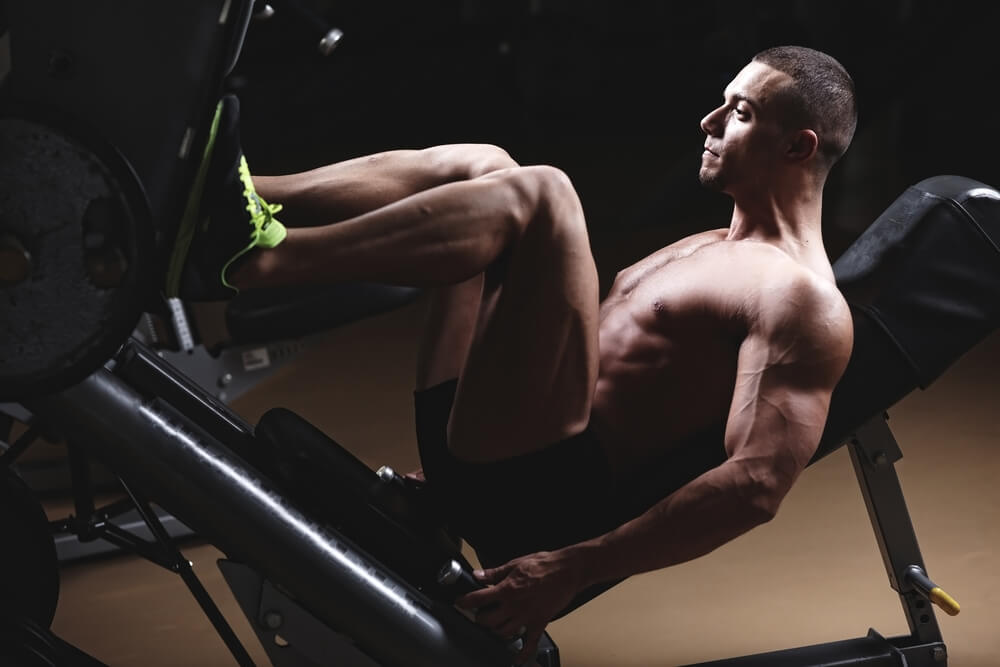
Do you have an upper lower split workout plan? You should. The good news is that we do. And, all you have to do is read about it all right here. You’re welcome.
A proper upper lower split workout plan produces the best results when it targets major muscle groups accordingly. Many training programs fall short because they place more emphasis on isolation exercises rather than compound movements. This will cause muscles to grow out of proportion with each other. We’ll take a look at what goes into a proper upper lower split workout plan and give you a workout routine to achieve your goals.
Compound Exercises vs. Isolation Exercises
This is where a lot of new fitness buffs get confused. Not all exercises are equal even though they have been noted to target the same primary muscle. For example, doing the bench press is not the same as a pec flye.
The bench press uses a variety of muscles to execute the movement and stabilize your body. Cable flyes do require stabilization as well, but the secondary muscles aren’t used to the same extent.
Another example would be the overhead press and front raises. The overhead press requires a lot of muscles for execution. That would include shoulders, traps, abs, lower back and even leg muscles. The front raise merely isolates the anterior deltoid and that is about it.
You should be doing more compound lifts.
Why?
They use multiple muscle groups and joints to carry out proper movement. Isolation exercises are good for solely targeting an area of the body. But they should only be used after compound movements have been completed.
The reason for this is because you want to use the bulk of your energy and strength on compound lifts. Whatever is left over can be used for isolation lifts. This is why a lot of powerlifters rarely work on isolation moves. All their anaerobic energy has already been depleted performing squats, deadlifts, cleans, etc.
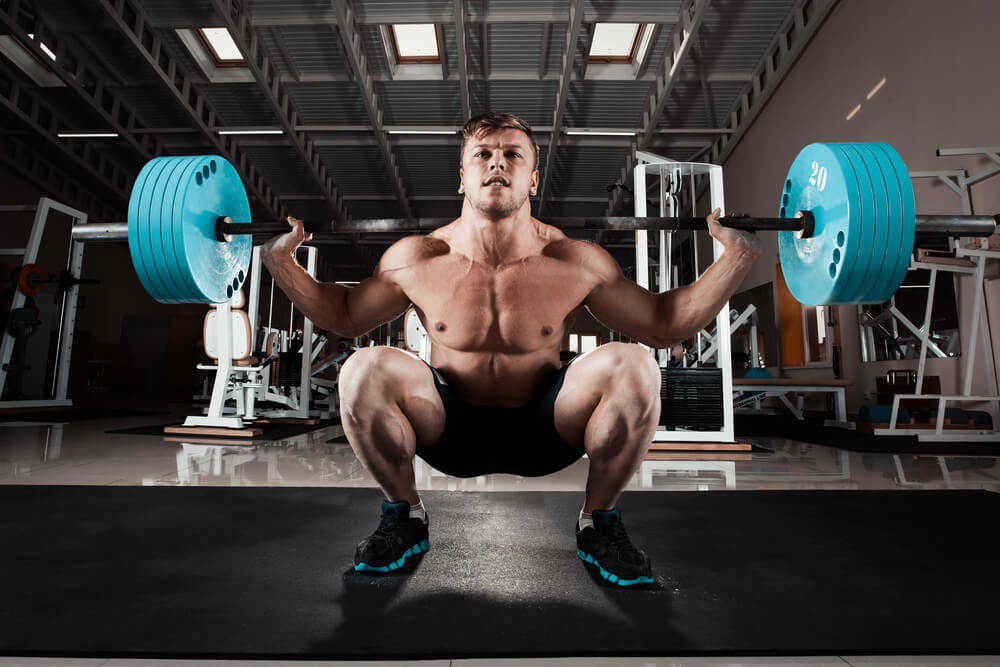
Upper lower Split Workout This Is How It’s Done
This type of workout is basically exactly what the name implies. You perform a workout program that focuses one day on upper body muscles. The next day you only perform lower body exercises along with a focus on your abs. Then take a rest day before repeating the process one more time.
An upper lower split workout program looks like this:
Day 1: Upper Body
Day 2: Lower Body
Day 3: Rest
Day 4: Upper Body
Day 5: Lower Body
Day 6: Rest
Day 7: Rest
There are three rest days instead of the usual two. Other workouts only have two rest days because you train each muscle group equaling five days of training. Each workout has its own effects on each person. For example, some may work better with a five-day training program. The reason would usually be because they are already pretty well conditioned and thus need more for growth.
But a split workout works well for most because it gives you plenty of proper rest. A full day used to rest your muscles is more effective for protein synthesis. This is when your body uses protein that has been consumed and sends it into your muscles. Since training damages your muscles, they need to repair the broken protein cells and replace them with fresh ones. The end result is stronger and denser muscle cells making your muscles appear bigger.
Rest during a five-day training program is a bit different. For example, a lot of people target chest and then shoulders the next day. The thing is yes, you are giving your chest muscles a break, but your shoulders are used pretty significantly during chest pressing movements, and even chest flyes. That’s why the better way would be chest and then legs. No matter what, you are always placing a significant amount of resistance on a secondary muscle group or two. This is why a split workout has better effects for most – especially beginners to working out.
Your upper lower split workout program is also broken down further by what exercises, sets, and reps are chosen. These factors are usually determined depending on the chosen resistance.
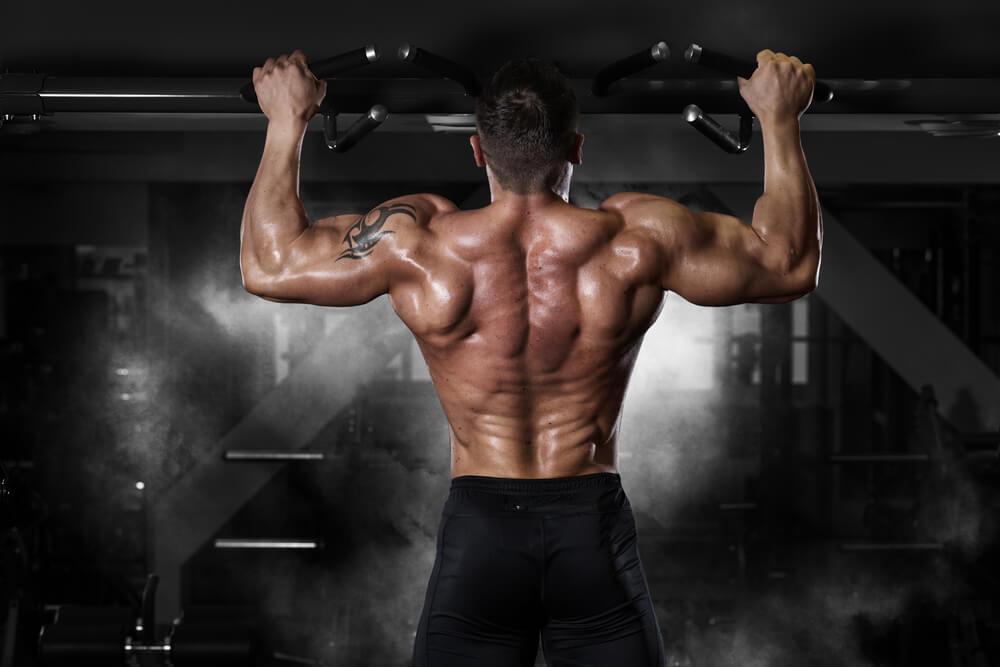
Workout Splits : Volume And Resistance Are Key
You usually will not use heavy resistance settings during a split workout. The highest will likely be a moderate-heavy resistance. That clocks in at around 75 to 80% of your one rep max. Why? The reason for this is because the first heavy lift you perform already sucks up a lot of energy.
Energy conservation is crucial to ensure all the muscles in your upper or lower body get equal attention. You can do moderate-heavy resistance on the primary lifts, but during isolation, you really should only use moderate resistance. This brings up the point that resistance determines volume.
What is Volume?
No, we’re not referring to the sound coming from your speakers. In this case, volume is basically the sets and reps inserted into a workout program for the day. Of course, reps are the times you perform an exercise. Meanwhile, sets are the times you perform that many reps.
Resistance comes into play because you can’t perform three sets of 15 reps using heavy resistance.
Why?
This is going to drain your energy and quite possibly cause serious injury. Plus, you most likely will not be doing the exercise using proper form. Instead, you can base your volume with resistance by the table shown below:
Light Resistance = 12 to 15 reps
Moderate Resistance = 8 to 12 reps
Heavy Resistance = 5 to 7 reps
Very Heavy (90 to 95% 1RM) = 1 to 4 reps
This is how you should think of reps when you hear of a type of resistance to be used. Trainers obviously get more detailed by using percentages. This is an easy and effective way to guess the volume for your training day.
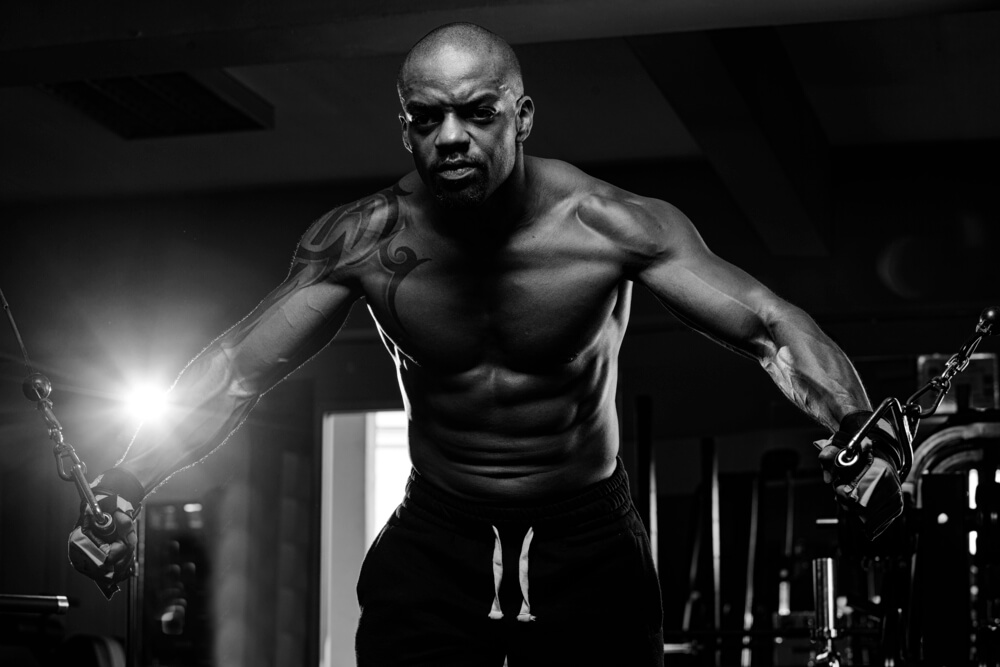
Upper lower Split Workout:This Is The Layout
By now you should have a decent understanding of what this type of workout is. So let’s piece it all together.
Your upper body workout days will be compound lifts first. It should look like this:
Chest compound sets x3
Back compound sets x3
Shoulder compound sets x3
After these nine sets have been completed focusing on compound movements, you should then switch to isolation exercises. That should be something like this:
Chest isolation sets x2
Back isolation sets x2
Shoulder isolation sets x2
Isolation lifts can involve the use of dumbbells, cables or even machines. Some isolation exercises can even be considered compound such as the seated machine incline press. Either is fine, but it must be with moderate weight and nice controlled contractions.
Then you still have major arm muscles to target as well. Try this:
Triceps isolation sets x3
Biceps isolation sets x3
This may seem like a lot, but you are technically only doing two exercises for each core muscle group, and then one exercise for your arm muscles. It’s simple and effective.
Your lower body workout days will also be compound lifts first. Calves are a bit different since there is not really a compound movement for them. They are inserted as isolation in place of glutes.
Quad compound sets x3
Hamstring compound sets x3
Glutes compound sets x3
After these nine sets of lower body compound lifts, you need to switch to isolation movements.
Quad isolation sets x2
Hamstring isolation sets x2
Calves isolation sets x3
You still have not really placed much focus on your abdominal and oblique regions, so you need to hit those as well for an all-around workout program. Try this:
Abdominal exercise sets x3
Oblique exercise sets x3
They don’t need a whole lot of weekly attention because they are used during stabilization efforts with compound lifts.
Don’t Forget Your Rest Days
Your body needs enough rest to complete protein synthesis. Studies show this takes a minimum of 24 hours. During the rest phase, you should be doing morning and evening stretches to keep your muscles repairing faster.
Morning stretches are going to be active based, which is when you perform movements that keep your joints and muscles in motion. Examples would be pendulum swings, high knees, arm circles, etc. Studies also show that active stretching is important for 5 to 10 minutes prior to resistance training.
Static stretching is when you place a joint in its full range of motion (ROM) and then hold that position for 30 seconds or more. Exercise examples include cross arm stretches and bent over toe touch. These are not good to perform as a warm up, and some studies suggest that they actually decrease muscle strength before training.
This is why they work great post workout on training days and in the evenings for non-training days. Stretching routinely during rest is great for reducing muscle soreness. When your muscles are sore they become stiff and don’t allow maximum nutrient flow to keep the repair process heightened.

Don’t Forget Your Nutrient Intake
Next you have the actual consumption of nutrients. A good rule of thumb for people performing strength training programs such as this is to consume 1.2 to 1.4 grams of protein per pound of body mass. This is for optimum muscle recovery, growth and prevention of muscle loss through training fatigue.
If you don’t consume enough protein to match your training program, your muscles are going to become very sore and the effects will likely last for days instead of 24 hours. Plus low protein consumption causes your muscles to become used as energy, which is not good at all for your gains.
Carbs and fats really depend on if your focus is significant muscle gains or fat loss. In any case, you definitely want to consume carbs two hours prior to training and right after training. Carbs are your main energy source for anaerobic training and need to be reloaded post workout.
Plenty of veggies and fruits should be consumed because they are lower in calories and contain a lot of micronutrients such as vitamins and calcium. You definitely want strong bones for training, especially as you get older. If you don’t consume dairy products, then you should consider broccoli or calcium reinforced beverages.
The Full Upper Lower Split Workout Plan
Here is your full workout program to use weekly. Consider swapping out exercises for similar ones every couple of months.
Day 1 Is For Your Upper Body
Exercise Sets Reps
Flat Bench Barbell Press x3 x6-8
Yates Barbell Row x3 x6-8
Seated Barbell Overhead Press x3 x6-8
Standing Cable Flye x2 x8-10
Standing Cable Reverse Flye x2 x8-10
Wide Grip Upright Row x2 x8-10
Dumbbell Overhead Triceps Extension x3 x8-10
Ez-Bar Biceps Curl x3 x8-10
Day 2 Is For Your Lower Body.
Exercise Sets Reps
Barbell Back Squat x3 x6-8
Stiff Legged Deadlift x3 x6-8
Barbell Hip Thrust x3 x6-8
Leg Extension x2 x8-10
Leg Curl x2 x8-10
Calf Raise Machine x3 x8-10
Hanging Leg Raise x3 x8-10
Standing Oblique Crunch w/ Plate x3 x8-10
Day 3 Is For Rest.
Day 4 Is For Your Upper Body.
Exercise Sets Reps
Incline Bench Barbell Press x3 x6-8
Conventional Deadlift x3 x6-8
Standing Barbell Overhead Press x3 x6-8
Seated Single Arm Machine Press x2 x8-10
Lateral Pulldown x2 x8-10
Barbell Front Row x2 x8-10
Cable Rope Triceps Pulldown x3 x8-10
Dumbbell Seated Hammer Curl x3 x8-10
Day 5 Is For Your Lower Body.
Exercise Sets Reps
Barbell Front Squat x3 x6-8
Good Morning x3 x6-8
Cable Rope Pull Through x3 x6-8
Dumbbell Lunge x2 x8-10 (per leg)
Dumbbell Stiff Legged Deadlift x2 x8-10
Seated Calf Raise Machine x3 x8-10
Weighted Decline Crunch x3 x8-10
Medicine Ball Russian Twist x3 x8-10
Day 6 And Day 7 Is For Rest!
Conclusion
Within two to three months you should start experiencing significant changes in your strength and body composition. Remember to switch exercises out every couple of months to prevent routines from forming. That’s when boredom may set in. Keep it fun and stay on course. Follow this plan and track your results.
By Brian Pankau, CPT
Latest posts by Terry M (see all)
- Garage Gyms - Aug 1, 2018
- Kettlebells – Why They Should Be Added To Your Routine. - Jul 24, 2018
- Weight Belts: What Are They Really For? - May 31, 2018





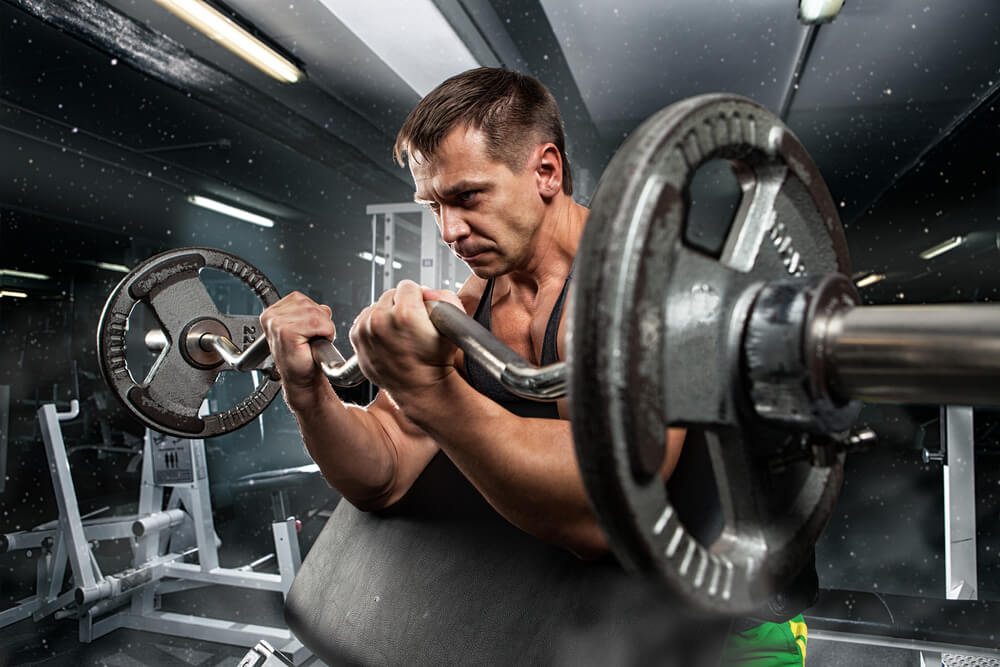




Great Post..!!
Thanx for sharing this upper lowe split wokrout..
[…] also can aid in the performance of most other upper body lifts along the way. With several variations available to help you target different aspects of your neck, […]
[…] only is having a strong lower body essential to nearly everything you do, but you burn more calories with lower bodywork thanks to the […]
Barbell front row – is that bent over or upright? Thanks
What about the lateral deltoids? What are the exercises that will hit them in the upper split workout? Thank you.
I have a lot of fat to lose so would it be okay if I do HIIT after my upper days and LIIS on 1 or 2 rest days!?
nice works really well, cheers mate
how to gain size
how to put on sixe